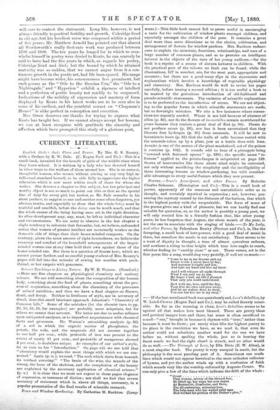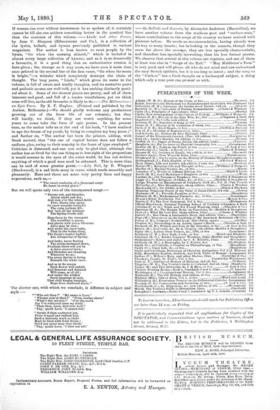POETRY.—Ivan's Love-Quest, and other Poems. By Malcolm Charles Salaman. (Remington
and Co.)—This is a small book of poems, apparently of the sensuous and materialistic order as to thought, and certainly mystical in expression ; not, however, pos- sessing the mystery caused by the distance of the horizon, that which in the highest poetry veils the unspeakable. The form of some of the poems gives one a kind of pleasure, but we can hardly find one suitable for quotation, so, as the author is possibly a young poet, we- will only remind him in a friendly fashion that, like other young poets, he has forgotten that August, the silent month of the year, is not the one to associate with the singing of birds.—To My Lady, and other Poems, by Pakenham Beatty (Provost and Co.), is, like the foregoing, a small book of love-poems, with a good deal of music in them, but somehow the music is not satisfactory. There seems to be- a want of dignity in thought, a tone of almost querulous sadness,. and nowhere a rising to that height which true love ought to reach, whether finding its "earthly close" or not. These verses, set in the first poem like a song, would sing very prettily, if well set to music :— "Caine to me in my dreams and say Sweet words I never hear by day, And murmur lovingly and low, And take my hand and kiss my brow.
And I will whisper all night through What I can only say to you,
My hopes I had, my life I planned, That only you could understand.
Rest with me, love, until the day, Then kiss me once and pass away, And let me waken, dear, to weep, Yon can but kiss me in my sleep."
f the last-mentioned book was querulously sad, Love's Rebellion, by W. Laird-Clowes (Regan Paul and Co.), may be called fiercely miser, able. So far as the meaning is clear, Love's Rebellion seems to be against all that makes love most blessed. There are pretty ideas and poetical images here and there, but sense is often sacrificed to sound—" rue," brought in because it rhymes with "true," rather than because it must be there; yet surely what lifts the highest poetry to its place is the conviction we have, as we read it, that even its author could not substitute another word for the one we have before us, without spoiling the whole, just as in hearing the finest music we feel the right chord is struck, and no other would do so well.—The Triumph of Love, by Ella Dietz (E. W. Allen), is a most singular book. The poetry is very unequal in merit, but the philosophy is the most puzzling part of it. Sometimes one reads lines which would not appear heretical to the most orthodox collector of hymns, and yet the author winds up with a confession of faith which sounds very like the worship enforced by Auguste Comte. We can only give a few of the lines which indicate the drift of the whole :
"Grant That woman, mirror of the blessed Sun,
Be lifted up. her reign has now begun As Reconciler, Comforter, and Dove,
The all-embracing, universal love,
The help-meet who has waited until man
Had worked his portion of the Father's plan,"
If woman can ever without irreverence be so spoken of, it certainly cannot be till she can achieve something better in the poetical line than the contents of this volume. —Linda and other Poems, by Jane C. Simpson (Edmonstone and Co.), is a collection of the lyrics, ballads, and hymns previously published in various magazines. The author is best known to most people by the hymn, "Go when the morning shineth," which is included in almost every large collection of hymns; and as it is so deservedly a favourite, it is a good thing that an authoritative version is here given ; for, strange as it may seem, we have seen it more than once printed in the second line of the first verse, "Go when the moon is bright,"—a mistake which completely destroys the chain of thought. The long poem, "Linda," which gives its name to the volume, is full of sweet and kindly thoughts, and its narrative parts and pathetic scenes are well told, yet it has nothing distinctly poeti- cal about it. Some of the shorter pieces are pretty, and all of them innocent and good, and full of a tender trustfulness, yet we think none will live, as the old favourite is likely to do.—The Millennium: an Epic Poem. By E. F. Hughes. (Printed and published by the Author, Melbourne.)—We should gladly welcome any productions growing out of the freer life of our colonies ; but they will hardly, we think, if they are worth anything, for some years to come take the form of epic poems. In the present case, as the author tells us at the end of his book, "I have realised in age the dream of my youth, by living to complete my long poem ;" and farther on, "The author has been the printer, adding, with frank naiveté, that "the use of capital letters does not follow a uniform plan, owing to their scarcity in the fount of type employed." Criticism is disarmed, and one can only be glad that, although the author has so lived for the one thing as to lose sight of the proportions it would assume in the eyes of the outer world, he has not written anything of which a good man need be ashamed. This is more than can be said of some greater poets.--Lily Neil, by D. Wingate (Blackwood), is a sad little story in verse, which reads smoothly and pleasantly. Here and there are some very pretty lines and happy expressions, such as,— " The sweet confusion of a thousand songs He hears in every grove."
But we will quote only two of the interspersed songs :— " Storms yet, and thunder, Alarm night and day,
And rain o'er the wheat-fields Flies, blown into spray. Or snow-wreaths fantastic The calm hollows fill; But 'mid all the wildness The Spring liveth still.
Deepdown by the streamlet The woodbine is green, And plants with green blossoms Alive may be seen ; And under the snow-tufts, That to the hedge cling, The thorn's tender leaflets Are whispering of Spring.
And larks, never fearing The storm-darkened dawn, Proclaim there will yet be A daisy-snowed lawn ; And thrushes are chanting Wherever we go; The green Spring is living Beneath the white snow.
And so in its season Each flower will unfold, And Summer and Autumn Will come, as of old ; And under the wildest Snow-heapings of care, That chill human longings, Hope lives sheltered there."
'The shorter one, with which we conclude, is different in subject and .style
"'Who art thou?" My name is Love.' 'Whence com'st thou?" From realms above.' 'What's thy mission ?' O'er the earth Joy I've scattered since my birth.' 'Then thou, Love, dost ever well ?' 'Nay,' qnoth Love, '1 cannot tell.'
'Surely if thou scatterest joy, Fairy.winged and radiant boy, Such a heavenly work as thine Must be blest with fruit divine ? Grief can never near thee dwell.'
' Nay; quoth Love, 'I dare not tell.'
—In Ballads and Sonnets, by Alexander Anderson (Macmillan), we have another volume from the studious poet and "surface-man," whose contributions to the songs of his country we have noticed witlt pleasure before. He needs no recommendation, having already won his way to many hearts; but in looking at the sonnets, though they seem far above the average, they are less specially characteristic, and therefore less specially interesting, than his less formal poems. We observe that several in this volume aro reprints, and one of them at least was also in "Songs of the Rail." "May 1.1iddleton's Tarn" is very good, and will please all who do not mind and can understand the racy Scotch epithets, but it is too long to insert ; and the song to the " Cuckoo " has a fresh thought on a hackneyed subject, a thing which only a true poet can present us with.



































 Previous page
Previous page